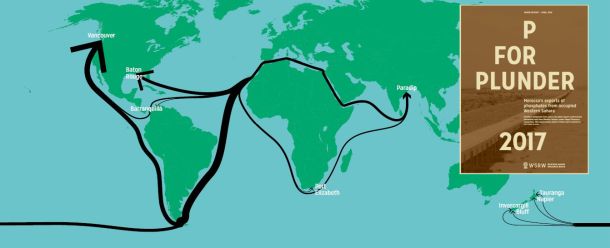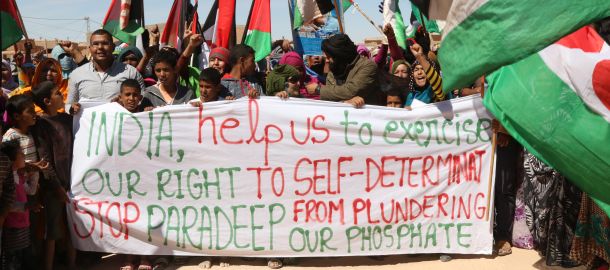Media clips of the Yara admissions of having imported phosphate from Western Sahara, 2005.
Yara suspected of illegal trade
Dagens Næringsliv [Norwegian Business Daily]
6 July 2005
Source: http://www.dn.no/forsiden/naringsliv/article547859.ece
[Translated by the Norwegian Support Commitee for Western Sahara]
Norwegian fertilizer company Yara may have been engaged in illegal importation of phosphates from the Western Sahara since 1999. Yara now risks prosecution for this kind of import, but does not wish to comment whether the company receives phosphates from the desert country.
The Oslo-listed company is called to state the origin of phosphate it buys from the Moroccan Office Cherifien des Phosphates (OCP). The demand is made by the Norwegian Support Commitee for Western Sahara, who suspects Yara to carry out illegal trade with the Moroccan company. This would be in violation of international law.
Sigmund Valberg, spokesman for the support committee said: “We have found out that half of the phosphate exported from OCP comes from occupied Western Sahara, and we demand an answer to whether the phosphate being purchased by the company origins here. If it does, this trading is in violation of international law.”
Meeting in May – still no answer
The committee met with representatives from Yara already in May and the company promised to find out the origin of the phosphate. According to Valberg the deadline for answering was scheduled to mid June, but this was later postponed until July 1st.
He commented: “We still have not heard from Yara, and my analysis is therefore that if the phosphate did not origin in Western Sahara, this should be easily clarified. The alternative is that the company is doing something wrong, and actually has purchased stolen goods.”
“Has not given priority to the matter”
When asked by www.dn.no, director of communications in Yara, Arne Cartridge, said the corporation will have an internal meeting to discuss the issue on Thursday.
“There we will try to answer the questions they have raised”, says Cartridge.
“Why has this taken so long?”
“We are being contacted for many different reasons, and in running our company on a daily basis, we chose not to give priority to this matter.”
“Can you document that the phosphate origins from Western Sahara?”
“I think that the group should get a reply before I answer to the media – this is the normal way of practicing good business”, Cartridge says, and believes that the support committee will receive an answer by the end of the week.
The Norwegian government is the biggest shareholder in Yara, with 36,2 percent of the shares, while the National Insurance Scheme Fund is the second biggest, with 6,1 percent.
Norwegian delegation expelled
Valberg is pleased to hear that Yara will soon present an answer but adds that he finds it strange the company has not prioritised the matter.
“Clearly it should be in their interest to find an answer to this as soon as possible. They may be held economically and legally responsible for illegally importing natural resources from an occupied country.”
A Norwegian delegation present in the Western Sahara to observe a human rights trial was last night expelled by Moroccan authorities.
The phosphate rich desert country of Western Sahara was a Spanish colony until 1975, but was occupied by Morocco shortly after the liberation. The liberation movement Polisario has been fighting for independence since then.
------------------------------------------------
Yara admits dubious phosphate trade
Dagens Naeringsliv (Norway)
7 July 2005
http://www.dn.no/forsiden/naringsliv/article549477.ece
Yara admits having bought phosphates from the occupied areas of Western Sahara. Now the trade is terminated, but the company does not exclude that the trade will be resumed. Yara has not informed its owners in the Department of Trade and Industry of the illegal trade.
The Norwegian Support Committee for Western Sahara has for a long time had a suspicion that Yara International has traded with phosphates in the Moroccan occupied areas of Western Sahara – an area that the Ministry of Foreign Affairs discourages Norwegian companies from trading with.
The committee has for months tried to have Yara’s response to this, and today, two days after www.dn.no wrote about the case, Yara sent a letter that proves that the company over a period of ten years has traded with phosphates from the occupied area.
27.000 tons.
“We have only bought and received three cargo vessels containing a total of 27.000 tons of phosphates Bou Craa, Western Sahara. The phosphate from the mines consists of less than 0,3 percent of Yara’s total volume in the period”, writes Yara in a letter that www.dn.no has received a copy of.
Last month, the ethical council of the Norwegian Petroleum Fund divested from the petroleum company Kerr-McGee, not because they traded directly with Western Sahara, but because they laid the premises for Morocco’s possible exploitation of natural resources in the area.
The State is not informed.
Yara has not found it necessary to inform its biggest shareholder in the Norwegian Ministry of Trade and Industry (MTI) about the phosphate trade, despite strong signals from the Government to not trade with the area. The government owns 36,2 percent of the Yara through the MTI, while the
National Insurance Scheme Fund owns 6,1 percent.
“No, we have not informed our owners about this case. It has not been a topic”, says Yara director of communications, Arne Cartridge to www.dn.no
Cartridge says the company now will terminate the phosphate trade in Western Sahara.
“We have done a total assessment based on our internal business standards. Therefore, we will seek to avoid trade now, but we do not exclude that we will resume the trade after a new evaluation”, he says.
--------------------------------------------------------------------------
Socialist Left party asks [Minister of Commerce and Industry] Brende to intervene.
Dagens Naeringsliv (Norway)
7 July 2005
http://www.dn.no/forsiden/utenriks/article549569.ece
Mr. Bjørn Jacobsen, member of Socialist Left Party in the Foreign Committee at the Norwegian Parliament means that Yara’s trade with Western Sahara is completely violating the norms that the politicians are insisting upon.
Yara admits today that they have traded phosphates from the mines in the Moroccan occupied Western Sahara.
Even though they now chose to terminate the trade, the company says in a letter to the Norwegian Support Committee for Western Sahara, that they “disagree with the juridical arguments of illegal trade”.
Director of communications, Arne Cartridge said also to www.dn.no that Yara does not exclude the possibility that the trade with Western Sahara will resume.
Member of Parliament Bjørn Jacobsen reacts very strongly on that.
”Here, Yara makes themselves a guarantee that they can purchase in the future. That is strongly diverging from the political direction we have chosen to follow in this region”, he says to www.dn.no
Jacobsen asks Minister of Commerce and Industry Mr. Børge Brende to tidy up in this situation, as a majority owner.
”We do have a more strict policy in this region, after the statements from the ambassador down there earlier this spring. Including the government agrees with this policy”, he says.
--------------------------------------------------------------------
“Caught with the pants down”
Dagens Naeringsliv (Norway)
7 July 2005
http://www.dn.no/forsiden/utenriks/article549514.ece
Yara admits having bought phosphates originating from mines in the occupied Western Sahara, but does not believe they have done anything illegal. “Yara is caught with the pants down, and I understand that it is uncomfortable” says Sigmund Valberg in the Norwegian Support Committee for
Western Sahara.
The fertilizer company now terminates the trade of phosphates from the area, but does not exclude the possibility that they resume the trade after having made “a total assessment”.
Grey zone
”We are happy that Yara terminates the trade, but we react strongly that they completely rejects the political and legal aspects in this matter. They minimize the serious situation in the region. I cannot understand that strategy”, Valberg says to www.dn.no
Valberg does not want to say that Yara’s trade is illegal.
“But it is no doubt that they operate in a grey zone that is very risky for the company. TGS-Nopec understood that when they withdrew two years ago, after the Norwegian Ministry of Foreign Affairs had recommended Norwegian companies to not trade in the region”, he says.
Discouraged trade
In their letter, Yara calls the attention to the fact that they only have traded 0,3 of their total phosphate volume from Western Sahara.
“They try to minimize the volume, but that has never been a topic to us. That is not of our business. We underline that the Ministry of Foreign Affairs has discouraged trade with the territory”, says Valberg.
New report: Western Sahara phosphate trade halved
The export of phosphate rock from occupied Western Sahara has never been lower than in 2019. This is revealed in the new WSRW report P for Plunder, published today.
New report on Western Sahara phosphate industry out now
Morocco shipped 1.93 million tonnes of phosphate out of occupied Western Sahara in 2018, worth an estimated $164 million, new report shows. Here is all you need to know about the volume, values, vessels and clients.
New report on contentious Western Sahara phosphate trade
Morocco shipped over 1.5 million tonnes of phosphate out of occupied Western Sahara in 2017, to the tune of over $142 million. But the number of international importers of the contentious conflict mineral is waning, WSRW's annual report shows.
New report on global phosphate trade from occupied Western Sahara
Over 200 million dollars worth of phosphate rock was shipped out of occupied Western Sahara last year, a new report from WSRW shows. For the first time, India is among the top importers.



